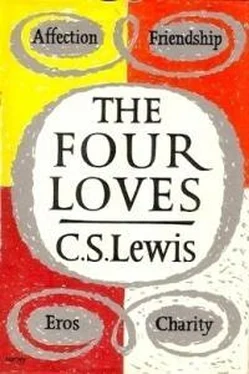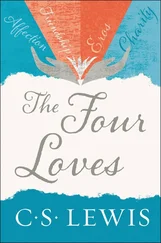As so often, Our Lord's own words are both far fiercer and far more tolerable than those of the theologians. He says nothing about guarding against earthly loves for fear we might be hurt; He says something that cracks like a whip about trampling them all under foot the moment they hold us back from following Him. "If any man come to me and hate not his father and mother and wife … and his own life also, he cannot be my disciple" ( Luke XIV, 26).
But how are we to understand the word hate ? That Love Himself should be commanding what we ordinarily mean by hatred—commanding us to cherish resentment, to gloat over another's misery, to delight in injuring him—is almost a contradiction in terms. I think Our Lord, in the sense here intended, "hated" St. Peter when he said, "Get thee behind me." To hate is to reject, to set one's face against, to make no concession to, the Beloved when the Beloved utters, however sweetly and however pitiably, the suggestions of the Devil. A man, said Jesus, who tries to serve two masters, will "hate" the one and "love" the other. It is not, surely, mere feelings of aversion and liking that are here in question. He will adhere to, consent to, work for, the one and not for the other. Consider again, "I loved Jacob and I hated Esau" ( Malachi I, 2–3). How is the thing called God's "hatred" of Esau displayed in the actual story? Not at all as we might expect. There is of course no ground for assuming that Esau made a bad end and was a lost soul; the Old Testament, here as elsewhere, has nothing to say about such matters. And, from all we are told, Esau's earthly life was, in every ordinary sense, a good deal more blessed than Jacob's. It is Jacob who has all the disappointments, humiliations, terrors, and bereavements. But he has something which Esau has not. He is a patriarch. He hands on the Hebraic tradition, transmits the vocation and the blessing, becomes an ancestor of Our Lord. The "loving" of Jacob seems to mean the acceptance of Jacob for a high (and painful) vocation; the "hating" of Esau, his rejection. He is "turned down", fails to "make the grade", is found useless for the purpose. So, in the last resort, we must turn down or disqualify our nearest and dearest when they come between us and our obedience to God. Heaven knows, it will seem to them sufficiently like hatred. We must not act on the pity we feel; we must be blind to tears and deaf to pleadings.
I will not say that this duty is hard; some find it too easy; some, hard almost beyond endurance. What is hard for all is to know when the occasion for such "hating" has arisen. Our temperaments deceive us. The meek and tender—uxorious husbands, submissive wives, doting parents, dutiful children—will not easily believe that it has ever arrived. Self–assertive people, with a dash of the bully in them, will believe it too soon. That is why it is of such extreme importance so to order our loves that it is unlikely to arrive at all.
How this could come about we may see on a far lower level when the Cavalier poet, going to the wars, says to his mistress:
I could not love thee, dear, so much
Loved I not honour more.
There are women to whom the plea would be meaningless. Honour would be just one of those silly things that Men talk about; a verbal excuse for, therefore an aggravation of, the offence against "love's law" which the poet is about to commit. Lovelace can use it with confidence because his lady is a Cavalier lady who already admits, as he does, the claims of Honour. He does not need to "hate" her, to set his face against her, because he and she acknowledge the same law. They have agreed and understood each other on this matter long before. The task of converting her to a belief in Honour is not now—now, when the decision is upon them—to be undertaken. It is this prior agreement which is so necessary when a far greater claim than that of Honour is at stake. It is too late, when the crisis comes, to begin telling a wife or husband or mother or friend, that your love all along had a secret reservation—"under God" or "so far as a higher Love permits". They ought to have been warned; not, to be sure, explicitly, but by the implication of a thousand talks, by the principle revealed in a hundred decisions upon small matters. Indeed, a real disagreement on this issue should make itself felt early enough to prevent a marriage or a Friendship from existing at all. The best love of either sort is not blind. Oliver Elton, speaking of Carlyle and Mill, said that they differed about justice, and that such a difference was naturally fatal "to any friendship worthy of the name". If "All"—quite seriously all—"for love" is implicit in the Beloved's attitude, his or her love is not worth having. It is not related in the right way to Love Himself.
And this brings me to the foot of the last steep ascent this book must try to make. We must try to relate the human activities called "loves" to that Love which is God a little more precisely than we have yet done. The precision can, of course, be only that of a model or a symbol, certain to fail us in the long run and, even while we use it, requiring correction from other models. The humblest of us, in a state of Grace, can have some "knowledge–by–acquaintance" ( connaître ), some "tasting", of Love Himself; but man even at his highest sanctity and intelligence has no direct "knowledge about" ( savoir ) the ultimate Being—only analogies. We cannot see light, though by light we can see things. Statements about God are extrapolations from the knowledge of other things which the divine illumination enables us to know. I labour these deprecations because, in what follows, my efforts to be clear (and not intolerably lengthy) may suggest a confidence which I by no means feel. I should be mad if I did. Take it as one man's reverie, almost one man's myth. If anything in it is useful to you, use it; if anything is not, never give it a second thought.
God is love. Again, "Herein is love, not that we loved God but that He loved us" ( I John IV, 10). We must not begin with mysticism, with the creature's love for God, or with the wonderful forestates of the fruition of God vouchsafed to some in their earthly life. We begin at the real beginning, with love as the Divine energy. This primal love is Gift–love. In God there is no hunger that needs to be filled, only plenteousness that desires to give. The doctrine that God was under no necessity to create is not a piece of dry scholastic speculation. It is essential. Without it we can hardly avoid the conception of what I can only call a "managerial" God; a Being whose function or nature is to "run" the universe, who stands to it as a headmaster to a school or a hotelier to a hotel. But to be sovereign of the universe is no great matter to God, In Himself, at home in "the land of the Trinity", he is Sovereign of a far greater realm. We must keep always before our eyes that vision of Lady Julian's in which God carried in His hand a little object like a nut, and that nut was "all that is made". God, who needs nothing, loves into existence wholly superfluous creatures in order that He may love and perfect them. He creates the universe, already foreseeing—or should we say "seeing"? there are no tenses in God—the buzzing cloud of flies about the cross, the flayed back pressed against the uneven stake, the nails driven through the mesial nerves, the repeated incipient suffocation as the body droops, the repeated torture of back and arms as it is time after time, for breath's sake, hitched up. If I may dare the biological image, God is a "host" who deliberately creates His own parasites; causes us to be that we may exploit and "take advantage of" Him. Herein is love. This is the diagram of Love Himself, the inventor of all loves.
God, as Creator of nature, implants in us both Gift–loves and Need–loves. The Gift–loves are natural images of Himself; proximities to Him by resemblance which are not necessarily and in all men proximities of approach. A devoted mother, a beneficent ruler or teacher, may give and give, continually exhibiting the likeness, without making the approach. The Need–loves, so far as I have been able to see, have no resemblance to the Love which God is. They are rather correlatives, opposites; not as evil is the opposite of good, of course, but as the form of the blancmange is an opposite to the form of the mould.
Читать дальше











